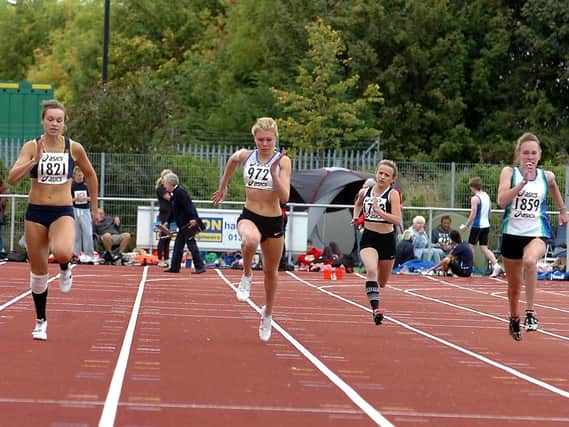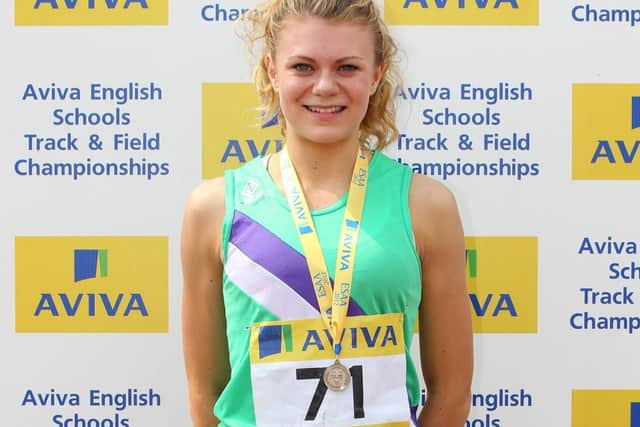Epilepsy battle for Doncaster athlete Beth Dobbin


Doncaster athlete Beth Dobbin who was diagnosed with epilepsy at the age of 13 is the perfect example of triumphing over adversity.
Determined not to let her condition hold her back determined Beth has gone onto smash the 200m Scottish record four times, be crowned British champion. She has also represented Great Britain in the Athletics World Cup, competing in the 200m final at the European Championships in Berlin.


Advertisement
Hide AdAdvertisement
Hide AdShe said: “Despite all the adversity I’ve faced, becoming the British champion has meant that it has all been worth it. I've also been able to inspire people with my story.”
Speaking about the diagnosis she said: “I had no idea what it was really.
“After my first seizure, I couldn't talk, I couldn't walk, I couldn't move the left side of my face. I couldn't recognise my parents and I had no memory. But emotionally has been the toughest part.” For Beth, running has been a form of therapy.
“Epilepsy can be extremely tough, both mentally and physically. Running was something that helped me deal with mental struggles, by blocking out everything else and just focusing on the run.
Advertisement
Hide AdAdvertisement
Hide Ad“The biggest part of my epilepsy battle has been the mental side. That’s where the athletics and running has been amazing. Athletics helps me so much mentally.”
Beth is now encouraging others to do the same at this year’s Epilepsy Action Bradford 10k on Sunday March 17.
Now in its 12th year, the race marks a major date in Yorkshire’s athletics calendar.
This popular run raises vital funds for the 600,000 people living with epilepsy in the UK. Following a second successive sell-out in 2018, the national Leeds-based charity has increased the number of places from 2,500 to 3,000 – making this year’s Bradford 10k the biggest yet.
Advertisement
Hide AdAdvertisement
Hide AdBeth is opening the race that has raised over £450,000 for the charity, with almost 12,000 runners crossing the finish line.
Speaking about how she dealt with the diagnosis Beth said: “When I was first diagnosed I remember feeling upset that I had to take medication every day. The doctors advised that I shouldn't go out on my own or take baths unsupervised.
“Looking back, that definitely isn't the end of the world but at the time it upset me. I also remember feeling that I didn't really understand what epilepsy was - so how was I going to explain it to others? I struggled to talk to anyone about it and it was a lot to deal with at a young age. I probably didn't deal with it very well at the time, which is why the Post Traumatic Stress Disorder developed later on.
“Before my diagnosis I ran competitively. After a large seizure left me unable to walk, I had to take a lot of time off athletics and started back slowly. From then on, my performances weren't very good. I believe this was down to my medication, as I was just so tired all the time. After a couple of months of coming off my medication I was performing so much better. I went from not being able to make teams at the English Schools Champs to winning a silver medal.”
Advertisement
Hide AdAdvertisement
Hide AdBeth is hoping by sharing her story it will help others going through the same thing.
She added: “Talk to people about how you are feeling about your epilepsy. Look for support around you, whether that's talking to people about how you're feeling or managing the physical symptoms as best you can. If you're not happy with something, speak to your doctors to see if there's anything you can do to change the aspects that are making you unhappy. It does get better! Live your life to the fullest because epilepsy doesn't have to stop you from achieving anything, if it can be managed in the right way.”
Carl Foster, Fundraising Events Manager at Epilepsy Action, said, “We’re delighted that Beth is opening the Epilepsy Action Bradford 10k this year. What she has achieved in the face of epilepsy is inspirational and she will be a huge boost to our runners.
“There’s still time to train, and we welcome anyone who wants to sign up and support the 600,000 people living with epilepsy across the UK. We welcome faces old and new to this year’s friendly event.”
Advertisement
Hide AdAdvertisement
Hide Ad“Epilepsy is a serious neurological condition that can affect anyone, at any age and from any walk of life. Life with epilepsy can be complicated. Epilepsy Action campaigns to improve epilepsy services, hosts a network of support groups and have a helpline staffed by epilepsy experts.
For more information about the Epilepsy Action Bradford 10k or to sign up, visit epilepsy.org.uk/bradford or call the events team on 0113 210 8797. The closing date for entries is Wednesday March 13.